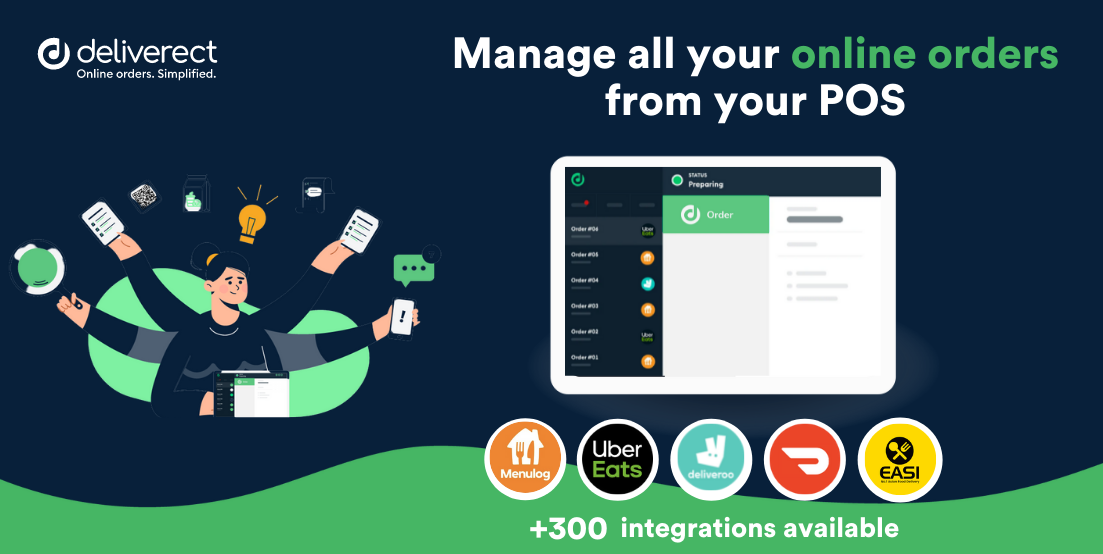Deliverect is a SaaS company that simplifies online food delivery management. Deliverect seamlessly integrates online orders from food delivery channels (Uber Eats, Menulog, Deliveroo, and Doordash etc.), allowing 20,000 establishments to improve operational service and increase customer satisfaction. Operating in over 40 markets around the world, Deliverect is trusted by restaurant and FMCGs such as Taco Bell, Burger King, and Unilever, as well as small and midsize restaurants and dark kitchens around the world. To find out more information visit www.deliverect.com.
How a tech startup is helping QSR brands succeed in the delivery business

QSR leader Craveable Brands has found a strong delivery partner in Deliverect.
Business owners in the food industry know that delivery is now more important than ever. The pandemic has forced many restaurants to change their business models, and delivery has become a vital part of that.
For established QSR holding company Craveable Brands, delivery has always been a focus for their business, particularly their three iconic brands: Red Rooster, Oporto, and Chicken Treat. But the pandemic has made delivery even more important, resulting in above-market growth for the company during this time.
Craveable Brands Head of Digital Brad Martin says that achieving this growth was not without challenges. The biggest challenge was ensuring that their food arrived hot and fresh to customers, which meant they had to carefully balance operations and technology.
"It's a very fine balance and difficult to get right, particularly when every variable from weather to time to promotions plays some role in adjusting demand," he said.
The surge in delivery had them scrambling to find personnel to continue operations during the pandemic. But they rose to the challenge, managing product supply, and delivery exceptionally well.
Behind this success is another factor: a trusted delivery integrations partner.
Next-level delivery integrations
Craveable Brands has been working with Deliverect for two years, and the relationship has been crucial to their success in delivery. Deliverect is an end-to-end platform that connects online food ordering platforms and aggregators with restaurants, simplifying the process of taking an order and managing menus across different brands.
"Deliverect had a huge impact on simplifying our operations," said Martin. "We knew what we wanted going into the project with Deliverect and have got what we needed; simplified processes in taking an order from aggregators, and improving the way in which we manage menus across our brands on the four delivery aggregators."
The results speak for themselves. Craveable's delivery business has seen significant growth since working with Deliverect. Now with Deliverect, Craveable is able to not only manage their menu easily but also connect to various delivery platforms seamlessly. The result is hot and fresh food delivered quickly and efficiently to customers.
"Deliverect has helped us a lot because it's given us the ability to connect to various delivery platforms with one click. It has helped us manage our menus better and given us the ability to push orders directly to our POS," said Martin.
And with Craveable's expansion into virtual restaurants, and opportunities with new and emerging channels, they felt a greater need to streamline their digital customer ordering processes.
The Deliverect team has risen to every occasion, becoming an invaluable partner for Craveable.
"Some of the same people we worked with offshore are now onshore and introducing themselves by name rather than just being a voice on the other end of the phone," said Martin. "The team has really grown, and so has our relationship with them."
But despite the huge opportunities in delivery, Martin offered a sobering word of advice to QSRs: don't put all your eggs in one basket.
According to him, there will be increasing pressures on delivery moving forward, not least being cost pressures across goods, fuel, and labor. This puts pressure on the entire distribution chain to provide exceptional service in return for the costs charged to customers.
"I think delivery is here to stay, but I don't believe that it will be the primary service channel for QSRs," he said. "There's still a lot of headroom for growth, but in the next couple of years at least, I think the convenience and immediacy of drive-thru, the experience of dining in, and the quick grab-and-go takeaway will continue to drive the physical store as the primary space."
Even though delivery is a vital part of many restaurants' business models, it's still not the be-all and end-all. QSRs need to focus on providing a great experience across all channels if they want to be successful in the long term.
At least, in delivery, they must have a trusted partner to help them navigate the challenges ahead.
"You’re fighting for share of virtual voice on the various platforms, you’re having to understand the differences between each in driving placement, managing the differences in operations. Each of the aggregators are a marketing platform as such, and using their platform to drive positive outcomes across customer acquisition, product trial, and frequency growth is where a business can really win in this space," he concluded.
Other Articles

Online engagement: the secret sauce of today’s successful QSRs

Tried and tested online menu ideas to boost delivery orders

The delivery is in the detail: Designing menus that build loyal customers


